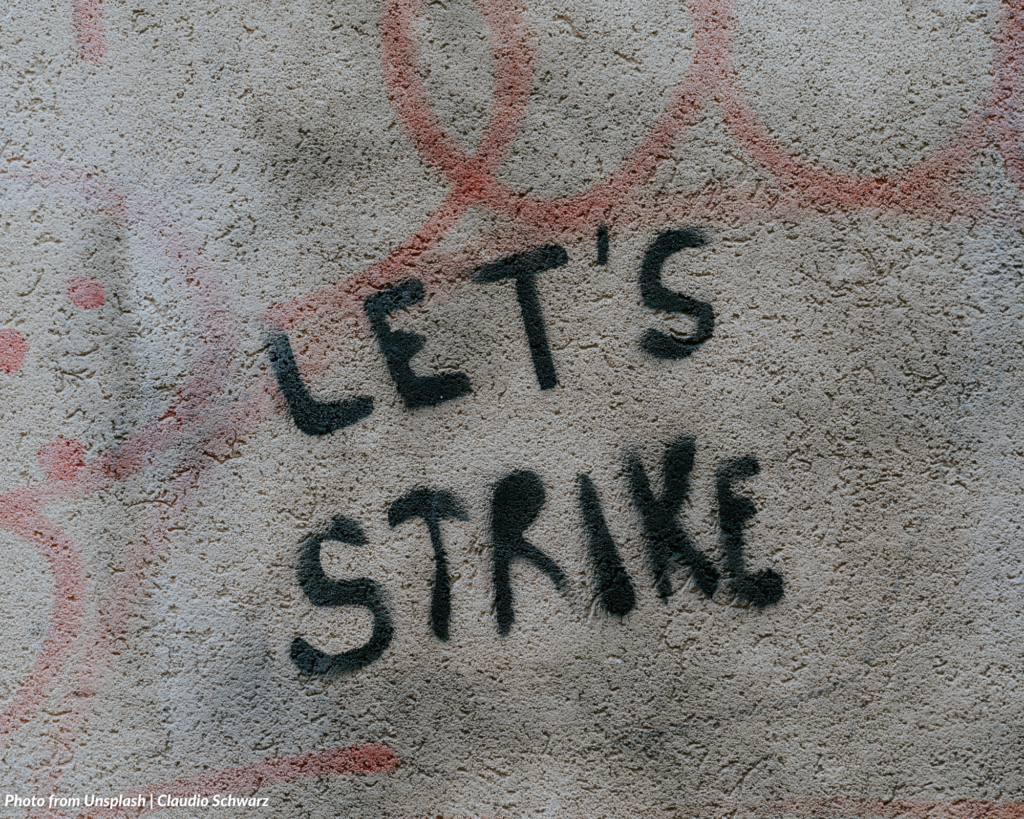
Photo from Unsplash | Claudio Schwarz
The following post does not create a lawyer-client relationship between Alburo Alburo and Associates Law Offices (or any of its lawyers) and the reader. It is still best for you to engage the services of a lawyer or you may directly contact and consult Alburo Alburo and Associates Law Offices to address your specific legal concerns, if there is any.
Also, the matters contained in the following were written in accordance with the law, rules, and jurisprudence prevailing at the time of writing and posting, and do not include any future developments on the subject matter under discussion.
AT A GLANCE:
- The Civil Service laws and rules governing concerted activities and strikes in the government service shall be observed, subject to any legislation that may be enacted by Congress. (Section 14, Executive Order No, 180)
- Employees of government-owned and/or controlled corporations (GOCCs) organized under the Corporation Code (without original charters) and are, therefore, covered by the Labor Code have the right to strike.
- Employees of the government and its political subdivisions or instrumentalities, including GOCCs organized with original charters and are therefore, covered by the Civil Service Law, rules and regulations, have no right to strike.
As defined under Article 219 (formerly Article 212) (o) of the Labor Code, a strike means any temporary stoppage of work by the concerted action of employees as a result of an industrial or labor dispute. (BIGG’s Inc. vs. Jay Boncacas, G.R. No. 200487, March 06, 2019)
However, with regard to government employees, the Supreme Court ruled in the 2004 case of Leonora Gesite vs. Court of Appeals, G.R. No. 123562-65, that the rule is that employees in the public service may not engage in strikes, mass leaves, walkouts, and other forms of mass action that will lead to the temporary stoppage or disruption of public service. The right of government employees to organize is limited to the formation of unions or associations only, without including the right to strike.
Does this mean that all employees in the government sector do not have a right to strike?
Section 14, Executive Order No, 180 (Governing the Exercise of the Right of Government Employees to Self-Organization) says:
Peaceful Concerted Activities and Strikes – The Civil Service laws and rules governing concerted activities and strikes in the government service shall be observed, subject to any legislation that may be enacted by Congress.
Further, according to Rule III, Section 4 of the Implementing Rules and Regulations of Executive Order No. 180, “the terms and conditions of employment in the government including any political subdivision or instrumentality thereof and government-owned and controlled corporations with original charters are governed by law and employees therein shall not strike for the purpose of securing changes thereof.”
As such, in the exercise of the right to strike, government employees can be categorized as follows:
Category 1: Employees of government-owned and/or controlled corporations (GOCCs) organized under the Corporation Code (without original charters) and are, therefore, covered by the Labor Code.
Category 2: Employees of the government and its political subdivisions or instrumentalities, including GOCCs organized with original charters and are therefore, covered by the Civil Service Law, rules and regulations.
Strike under the Labor Code
Pursuant to the Guidelines Governing Labor Relations:
The right to strike is a constitutional and legal right of the workers as employers have the right to lockout, all within the context of labor relations and collective bargaining. Subject to the enactment by Congress of amendments or a new law on labor relations, the provisions of existing laws shall govern the exercise of those rights.
Strike under the Civil Service Law, Rules and Regulations
Under Civil Service Commission Resolution No. 021316 which provides rules on prohibited concerted mass actions in the public sector:
Sec. 4. Limitation on the Right to Self-Organization. The right to self-organization accorded to government employees as described in the foregoing section shall not carry with it the right to engage in any form of prohibited concerted activity or mass action causing or intending to cause work stoppage or service disruption, albeit of temporary nature.
Sec. 5. Definition of Prohibited Concerted Mass Action. As used in this Omnibus rule, the phrase prohibited concerted activity shall be understood to refer to any collective activity undertaken by government employees, by themselves or through their employees’ organizations, with the intent of effecting work stoppage or service disruption in order to realize their demands or force concessions, economic or otherwise, from their respective agencies or the government. It shall include mass leaves, walkouts, pickets and acts of similar nature.
Given the aforementioned, it is important to note that employees falling under Category 1, specifically those employees of Government-Owned and Controlled Corporations (GOCCs) lacking a charter, possess the right to strike, akin to their counterparts in the private sector for they are both covered by the provisions of the Labor Code.
On the contrary, those falling under Category 2, encompassing employees of the political subdivisions, and GOCCs with an original charter, are devoid of the right to strike since under the Civil Service Law, they are absolutely prohibited from conducting a strike.
In essence, the distinction in categories determines the applicability of the right to strike based on the governing laws for each group of government employees.
Read also: When can a legal strike turn into an illegal strike?
Alburo Alburo and Associates Law Offices specializes in business law and labor law consulting. For inquiries regarding taxation and taxpayer’s remedies, you may reach us at info@alburolaw.com, or dial us at (02)7745-4391/0917-5772207.
All rights reserved.


